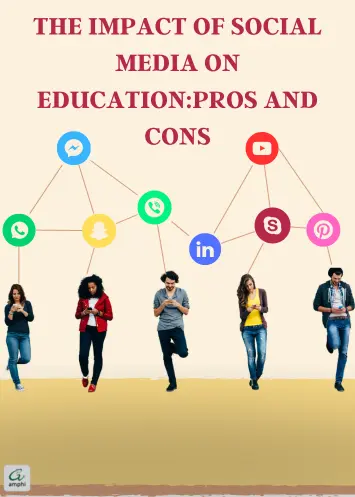The ongoing discussion regarding social media’s impact on education involves a thorough analysis of its pros and cons. Within this discourse, we explore the intricate effects that social media imparts on the educational realm. While serving as information capitals, fostering global connections and enabling cooperative literacy these platforms also pose enterprises about distractions, cyberbullying and sequestration. Navigating these challenges requires preceptors, scholars and institutions to strike a balance, staking on social media’s educational benefits while addressing its downsides. This disquisition seeks to illuminate the nuanced relationship between social media and education, admitting both its empowering implicit and the necessity for careful consideration.
Pros:
Social media platforms serve as invaluable resources for students, contributing to their learning and growth in diverse ways. The key advantages include:
Abundant Information Access: These platforms act as rich repositories of educational content, offering research materials, updates on current events, and other pertinent resources. Students can utilize them to broaden their knowledge base and stay well-informed.
Collaboration and Networking: Social media facilitates connections between scholars, preceptors, professionals, and peers, fostering collaboration and networking. Platforms like LinkedIn present openings for scholars to engage with assiduity experts and implicit instructors, enhancing both learning and career development.
Enhanced Engagement and Interaction: Educational institutions can harness social media to actively involve students in the learning process. Dynamic features such as interactive discussions, polls, and live sessions make learning more dynamic and enjoyable.
Global Learning Horizons: Geographical barriers dissolve on social media, enabling students to participate in global conversations and learn from diverse perspectives and cultures. This exposure broadens their understanding, enriching their overall learning experiences.
Collaborative Resource Sharing: Teachers and students can share educational resources, articles, videos, and research findings through social media. This collaborative approach enhances the learning process, offering additional materials for deeper exploration.
In summary, social media provides students with a multitude of benefits, ranging from information access and collaboration opportunities to heightened engagement and global learning experiences. Leveraging these platforms empowers students to elevate their learning outcomes and cultivate valuable skills for both academic and professional pursuits.
Cons:
Distractions: Social media platforms have turned integral to education, serving as information capitals and facilitating cooperative education. still, they also raise interest in distractions, cyberbullying, and privacy. To effectively work on social media’s educational benefits, preceptors, scholars, and institutions must strike a balance and address these downsides. This disquisition aims to shed light on the complex relationship between social media and education, admitting both its empowering implicit and the need for careful consideration.
Cyberbullying: The obscurity provided by social media platforms can lead to cyberbullying, affecting scholars’ internal health and well-being. Educational institutions must address and combat cyberbullying to produce a safe online environment.
Privacy Concerns: The use of social media in education raises enterprises about the sequestration of scholars and preceptors. particular information, prints and other details may be exposed, potentially leading to unwanted consequences.
Fake News and Mis-information: Social media is susceptible to the spread of fake news and misinformation. scholars may encounter unreliable information, affecting the veracity and quality of their examination and coursework.
Overreliance on Technology: Depending on social media for educational purposes can lead to an overreliance on technology. This may dwindle essential face-to-face relations and traditional tutoring styles, potentially hindering holistic literacy.
FAQ’s
Conclusion:
In conclusion, the influence of social media on education is complex. Despite its positive contributions to learning, collaboration, and global connections, challenges such as distractions, privacy concerns, and misinformation persist. It is imperative to find equilibrium and deploy effective strategies for responsible social media usage in educational contexts. This balance is essential for optimizing the benefits while mitigating the drawbacks associated with the integration of social media in the educational landscape.

